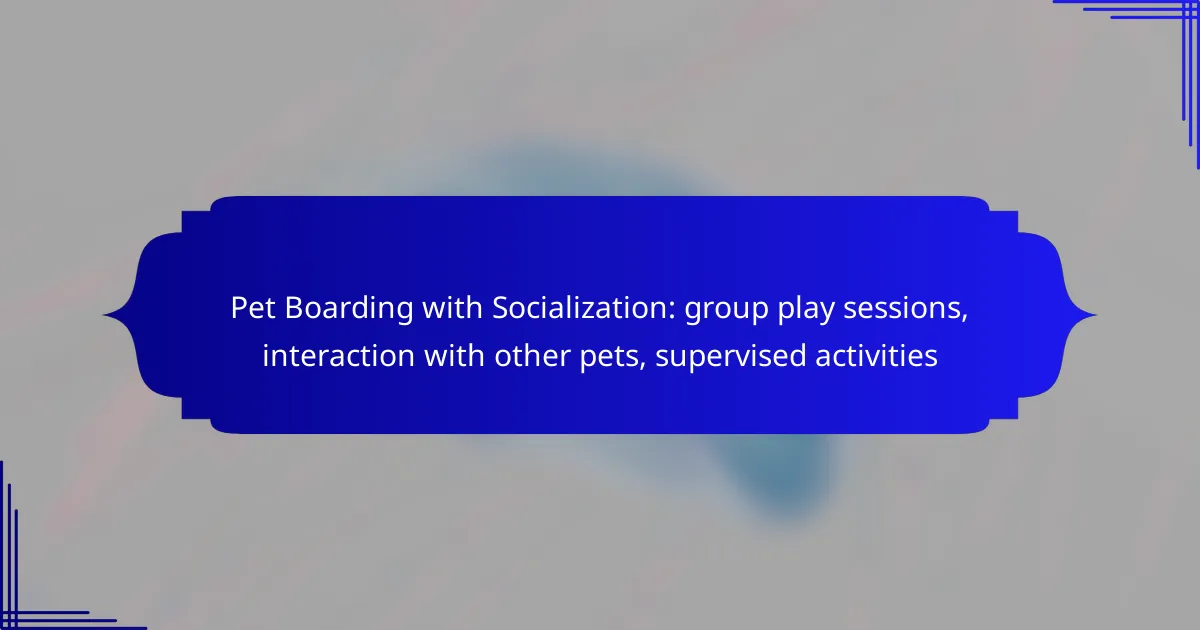Pet boarding with socialization provides a nurturing environment where pets can engage in group play sessions and interact with other animals. Supervised activities not only promote exercise and mental stimulation but also enhance overall well-being, making their stay enjoyable and beneficial. This approach fosters positive behaviors and helps pets thrive while away from home.

What are the benefits of pet boarding with socialization in Australia?
Pet boarding with socialization offers numerous advantages for pets, including enhanced interaction with other animals and supervised group play sessions. These experiences can lead to improved behavior and overall well-being for pets during their stay.
Improved social skills
Pets that participate in socialization during boarding develop better social skills, which are crucial for their interactions with other animals and humans. Group play sessions allow them to learn appropriate behaviors, such as sharing and taking turns, which can translate to more harmonious relationships at home.
Regular interaction with a variety of pets helps them become more adaptable and confident in different social situations. This is particularly beneficial for younger pets still learning how to navigate social environments.
Reduced anxiety
Socialization in a boarding environment can significantly reduce anxiety in pets. By engaging with other animals and being part of a structured routine, pets often feel more secure and less stressed. This is especially true for pets that may experience separation anxiety when away from their owners.
Supervised activities provide a distraction from their worries, allowing them to focus on play and interaction rather than their surroundings. Over time, this can lead to a more relaxed demeanor both during boarding and at home.
Enhanced physical activity
Pet boarding with socialization encourages physical activity through structured play sessions and group exercises. Regular movement is essential for maintaining a healthy weight and overall fitness, which can help prevent obesity-related issues.
Pets that engage in active play with others are likely to expend more energy than they would alone. This not only benefits their physical health but also contributes to better mood and behavior.
Better behavior
Socialization during boarding can lead to improved behavior in pets. Engaging with other animals in a supervised setting helps them learn acceptable behaviors and reduces tendencies toward aggression or fearfulness.
Boarding facilities often employ trained staff who can guide interactions and correct undesirable behaviors, fostering a positive learning environment. This can result in a more well-mannered pet upon returning home.
Increased mental stimulation
Participating in group activities and interacting with other pets provides essential mental stimulation. Boredom can lead to destructive behaviors, so keeping pets engaged is crucial for their mental health.
Boarding facilities often incorporate various games and challenges that stimulate pets’ minds, helping to keep them alert and happy. This mental engagement can lead to a more balanced and content pet overall.

How do group play sessions work in pet boarding?
Group play sessions in pet boarding facilities involve multiple pets engaging in supervised activities together. These sessions are designed to promote socialization, exercise, and mental stimulation, ensuring pets enjoy their time away from home.
Structured playtime schedules
Structured playtime schedules are essential for maximizing the benefits of group play sessions. Facilities typically allocate specific times throughout the day for play, allowing pets to engage in various activities like fetch, tug-of-war, or agility courses. This organization helps maintain a routine, which can reduce anxiety for pets.
For example, a typical schedule might include two to three play sessions lasting 30 to 60 minutes each, interspersed with rest periods. This balance ensures pets remain energetic and engaged without becoming overly tired.
Supervised interactions
Supervised interactions are crucial to ensure the safety and well-being of all pets involved in group play. Trained staff monitor the sessions closely, watching for signs of stress or aggression among pets. This supervision allows for immediate intervention if necessary, helping to prevent conflicts.
Staff may also facilitate activities that encourage positive interactions, such as group games or training exercises. This guidance helps pets learn social skills and reinforces good behavior in a controlled environment.
Size and temperament matching
Size and temperament matching is a key factor in creating safe and enjoyable group play sessions. Facilities often group pets based on their size, energy levels, and social behaviors to minimize the risk of injury and ensure compatibility. For instance, small, timid dogs may be paired with other gentle companions, while larger, more energetic breeds might play together.
Before joining a group, pets typically undergo an assessment to evaluate their behavior and compatibility. This assessment helps staff create balanced groups, enhancing the overall experience for all pets involved.

What types of supervised activities are offered?
Supervised activities at pet boarding facilities typically include agility training, group games, and socialization exercises. These activities are designed to promote physical health, mental stimulation, and positive interactions among pets.
Agility training
Agility training involves guiding pets through obstacle courses that enhance their physical coordination and mental focus. These courses may include jumps, tunnels, and weave poles, allowing pets to develop their skills in a fun environment.
Facilities often tailor agility sessions to different skill levels, ensuring that both novice and experienced pets can participate. Regular agility training can improve a pet’s overall fitness and confidence.
Group games
Group games are structured activities that encourage pets to interact and play together under supervision. Common games include fetch, tug-of-war, and relay races, which help build social skills and teamwork among pets.
These games are typically organized based on the pets’ size and temperament, ensuring a safe and enjoyable experience for all participants. Engaging in group games can reduce anxiety and promote a sense of community among pets.
Socialization exercises
Socialization exercises focus on helping pets become comfortable with various environments, sounds, and other animals. These activities may involve controlled introductions to new pets and people, as well as exposure to different stimuli.
Effective socialization is crucial for reducing behavioral issues and enhancing a pet’s adaptability. Regular participation in socialization exercises can lead to well-adjusted pets that are more confident in diverse situations.

How to choose the right pet boarding facility in Australia?
Choosing the right pet boarding facility in Australia involves assessing various factors such as accreditation, facility conditions, and customer feedback. Prioritize places that offer socialization opportunities and supervised activities to ensure your pet’s well-being during their stay.
Check for accreditation
Verify that the pet boarding facility is accredited by a recognized organization, such as the Pet Industry Association of Australia (PIAA). Accreditation ensures that the facility meets specific standards for safety, hygiene, and care.
Look for facilities that have undergone regular inspections and adhere to local regulations. This can provide peace of mind that your pet will be in a safe and well-maintained environment.
Visit the facility
Schedule a visit to the boarding facility to observe the environment and assess the conditions. Pay attention to cleanliness, space, and the general atmosphere. A well-kept facility should have adequate ventilation, safe play areas, and comfortable sleeping arrangements.
During your visit, interact with the staff to gauge their knowledge and attitude towards pet care. Ask about their protocols for socialization and supervision during group play sessions to ensure your pet will receive proper attention.
Read reviews and testimonials
Research online reviews and testimonials from other pet owners to gain insights into their experiences with the boarding facility. Look for feedback on the quality of care, the level of socialization provided, and any issues encountered during stays.
Consider checking platforms like Google Reviews or pet-specific forums to gather a range of opinions. Positive reviews highlighting happy pets and responsive staff can indicate a reliable boarding option.

What should you look for in a pet boarding contract?
When reviewing a pet boarding contract, focus on key elements such as cancellation policies, health and safety protocols, and insurance coverage. Understanding these aspects will help ensure your pet’s well-being and your financial protection during their stay.
Cancellation policies
Cancellation policies outline the terms under which you can cancel your pet’s boarding reservation. Look for details on any fees associated with cancellations, such as whether you can receive a full refund or if a partial charge applies if you cancel within a certain timeframe.
Many facilities require a notice period, often ranging from 24 to 72 hours before the scheduled drop-off. Familiarize yourself with these timelines to avoid unexpected charges.
Health and safety protocols
Health and safety protocols are crucial for ensuring your pet’s well-being while boarding. Verify that the facility has vaccination requirements, regular health checks, and emergency procedures in place. This helps prevent the spread of illnesses among pets.
Ask about their cleaning practices and how they handle sick pets. A reputable facility should have clear guidelines for isolating ill animals and maintaining a clean environment.
Insurance coverage
Insurance coverage protects both you and the boarding facility in case of accidents or injuries. Check if the facility carries liability insurance and what it covers, including medical expenses for your pet or property damage.
Some facilities may offer additional coverage options for peace of mind. Ensure you understand the terms and whether you need to purchase extra insurance to cover specific risks.

How much does pet boarding with socialization cost?
The cost of pet boarding with socialization typically ranges from $25 to $75 per day, depending on the facility and services offered. Factors such as location, type of accommodation, and additional activities can influence the price.
Factors Affecting Cost
Several factors can impact the cost of pet boarding with socialization. The facility’s location plays a significant role; urban areas often have higher prices compared to rural settings. Additionally, the type of accommodation, such as private suites versus shared spaces, can also affect pricing.
Services included in the boarding package, like group play sessions, training, or grooming, will further influence the overall cost. Facilities that offer more extensive socialization programs may charge a premium for these added benefits.
Typical Price Ranges
On average, you can expect to pay between $30 and $50 per day for basic pet boarding with socialization. Luxury facilities may charge upwards of $75 per day, especially if they provide specialized care or amenities.
Some establishments may offer discounts for extended stays or multiple pets, which can help reduce the overall cost. Always inquire about package deals or seasonal promotions to find the best value.
What to Look For
When selecting a pet boarding facility, prioritize those that emphasize socialization and supervised activities. Look for places that provide ample playtime with other pets, as this is crucial for your pet’s emotional well-being.
Check for staff qualifications and the facility’s safety protocols. Ensure that the environment is clean and that pets are monitored during play sessions to prevent any potential issues. Reading reviews and visiting the facility beforehand can also help you make an informed decision.
